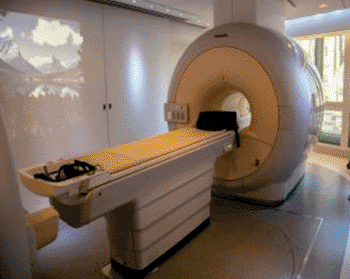PET/MRI Imaging Technology Shows Promise
By MedImaging International staff writers
Posted on 05 Sep 2013
Initial clinical experience in diagnosing and staging cancer patients with novel hybrid imaging modality technology shows favorable results. Posted on 05 Sep 2013
Researchers at University Hospitals Case Medical Center (Cleveland, OH, USA), in collaboration with researchers from Philips Healthcare (Eindhoven,The Netherlands) examined 145 cancer patients with a double-scanning protocol of Positron Emission Tomography (PET)/ Computerized tomography (CT) followed by a PET/ Magnetic Resonance Imaging (MRI) performed on the Philips Ingenuity TF PET/MRI system, which brings together the complementary capabilities of both to better visualize both functional and anatomical information, and to superimpose this information in a combined digital image.

Image: The Philips Ingenuity TF PET/MRI system (Photo courtesy of the University Hospitals Case Medical Center).
The researchers found that PET/MRI provided benefits in the diagnosis, staging, and treatment planning of colorectal cancers, cervical, uterine, ovarian, and pancreatic cancers, as well as in the diagnostic management of pediatric and young adult patients. PET/MRI combines high anatomic detail as well as bio-chemical and functional information provided by MRI with the metabolic, molecular, and physiologic information from PET. The technology fuses the images to more precisely pinpoint cancer locations and improve the accuracy of disease staging.
The study also outlines the considerations of reduction in overall radiation imaging exposure with PET/MRI versus other imaging technologies, offering a potential to decrease radiation exposure by replacing the CT component in PET/CT with MRI. According to the researchers, this may especially be an issue in pediatric and young adult patients with need for repetitive follow up imaging. The study outlining the initial clinical experience was published in the September 2013 issue of Current Radiology Reports.
“Our preliminary experience with this new diagnostic imaging technology proves that it is promising for oncologic applications,” said lead author radiologist Karin Herrmann, MD. “PET/MRI enhanced our ability to detect malignant areas and more accurately and confidently diagnose several types of cancers, potentially providing physicians with the ability to improve treatment planning and better monitoring of the disease.”
“This hybrid scanner has the potential to improve patient care by increasing understanding of the causes, effects, and development of disease processes to better diagnose cancer and various other diseases,” added said study coauthor nuclear radiologist Norbert Avril, MD. “We are very excited to be among the first to be able to help establish guidelines of how best to use this technology to guide physicians on the value of the PET/MRI in diagnosing and staging various forms of cancer. Our initial experience has shown that it may be a very important cancer-fighting tool.”
Related Links:
University Hospitals Case Medical Center
Philips Healthcare














